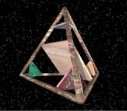Regina (program)
Regina is a suite of mathematical software for 3-manifold topologists. It focuses upon the study of 3-manifold triangulations and includes support for normal surfaces and angle structures.
 | |
| Original author(s) | Ben Burton, David Letscher, Richard Rannard, Hyam Rubinstein |
|---|---|
| Developer(s) | Ben Burton, Ryan Budney, William Pettersson |
| Initial release | December 2000 |
| Stable release | 5.1
/ Dec, 2016 |
| Repository | github |
| Written in | C++, Python |
| Operating system | Linux, Unix-like, Mac, Microsoft Windows, iOS |
| Available in | English |
| Type | Mathematical Software |
| License | GPL |
| Website | regina-normal |
Features
- Regina implements a variant of Rubinstein's 3-sphere recognition algorithm. This is an algorithm that determines whether or not a triangulated 3-manifold is homeomorphic to the 3-sphere.
- Regina further implements the connect-sum decomposition. This will decompose a triangulated 3-manifold into a connect-sum of triangulated prime 3-manifolds.
- Homology and Poincare duality for 3-manifolds, including the torsion linking form.
- Includes portions of the SnapPea kernel for some geometric calculations.
- Has both a GUI and Python interface.
gollark: I think.
gollark: If it's only slightly behind, which it might be, you can upgrade the CPUs.
gollark: You can probably swap the processors for 6-core xeons cheaply, at least.
gollark: I can run even modded Minecraft well on a 1050 nonTi.
gollark: You can bindmount a config file to the host.
See also
This article is issued from Wikipedia. The text is licensed under Creative Commons - Attribution - Sharealike. Additional terms may apply for the media files.